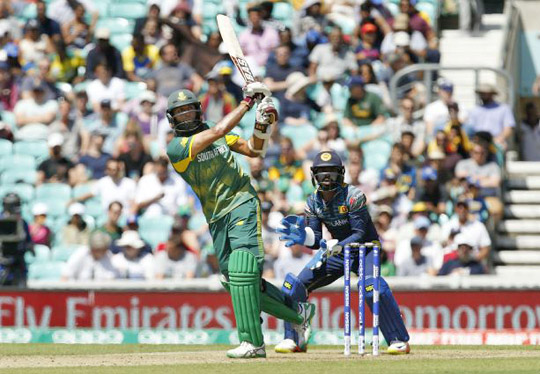London, Jun 4: South Africa captain AB de Villiers praised opener Hashim Amla and leg-spinner Imran Tahir in South Africa's huge 96-run win over Sri Lanka in their Champions Trophy opener.

The Proteas posted 299 at The Oval on Saturday thanks to former captain Hasim Amla, who scored his 25th ODI century. He was the fastest to the milestone having got there in 151 innings.
"It was an amazing innings by Hashim. He did really well to assess the conditions, and communicated well with us what kind of score is going to be good," De Villiers said.
Sri Lanka were cruising at 116 for two when Imran Tahir was introduced to the attack and the momentum swung South Africa's favour immediately.
Tahir was Man of the Match after finishing with four wickets for 27 runs.
"It was close to ten out of ten," said De Villiers.
"Not only with the ball in hand but that run out, it always shows me where the player is at when he shows that kind of dedication and commitment in the field. He is a great asset for us.
"He takes wickets and he is also economical most of the time. He had a fantastic performance today."
South Africa's fielding was outstanding as they produced two run outs through direct hits while the catching was top class.
"It's always important to take those moments. Those little opportunities that come your way, which we did.
"So I was very happy with the way we fielded. We worked really hard at that part of our game, and very happy with the way it went today," De Villiers added.
Sri Lanka, meanwhile, were in trouble after they took four hours and seven minutes to finish their 50 overs.
The time allocated to bowl the 50 overs in an innings is three and half hours.
The ICC banned captain Upul Tharanga for the next two games against India and Pakistan and the Sri Lankans were fined.
"We were slow between the overs. The Umpire brought it to my notice in the 40th over that we were three overs behind," Tharanga told journalists after the game.
Sri Lanka got off to a solid start reaching 82 for one at the end of the tenth over, but failed to capitalize.
"When Chandimal and I were batting, we were trying to build a partnership.
"The run out of Chandimal was costly and then after that Kapugedera got out soon. We still had a good run rate, but we lost too many wickets half-way through the innings.
"Someone needed to make a big score when chasing a target of 300," Tharanga added.
Lasith Malinga was returning to ODI cricket after 19 months having been sidelined due to injury and Tharanga was pleased with the effort of the fast bowler.
"He is playing a game after two years. He is getting better and better. He bowled well up front and finished things off well for us although he didn't get a wicket."





Comments
Add new comment